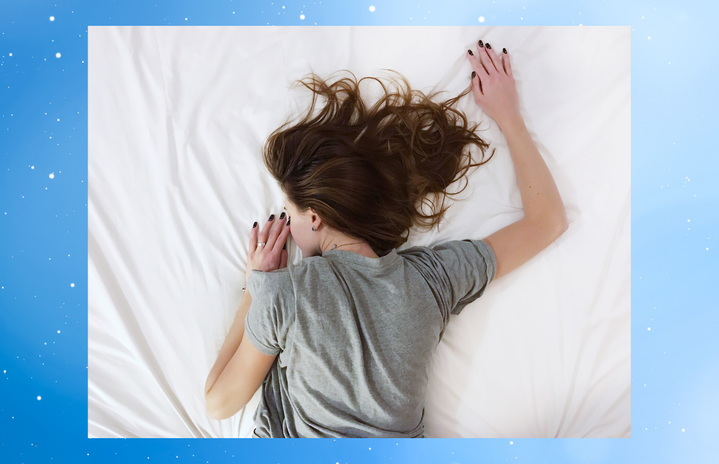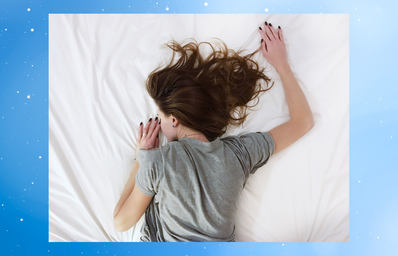Alas, another night of tossing and turning in your dorm or apartment. With each minute that passes, your anxiety spikes as you constantly look at the clock, wondering why you can’t fall asleep. You have an important test tomorrow morning, but you just can’t seem to doze off, no matter how many sheep you count. And after many sleepless nights, you finally realize that telling your brain to simply “shut off” doesn’t work so well. So, why are you having trouble sleeping in college?
To get the inside scoop, I spoke with Aneesa Shariff, PhD, a staff psychologist at the University of British Columbia, about some of the factors that could be keeping you up at night.
late-night studying
When cramming for an exam, you might use every bit of time that you have left in the day to study — right up until bedtime. But hitting the hay soon after closing those textbooks could be the reason why you’re having trouble falling asleep.
“Sometimes, when we’re doing really stimulating activities close to our bedtimes, that can inhibit our ability to get into a relaxed state and fall asleep,” Dr. Shariff tells Her Campus. This includes studying late at night, which is an all-too-common routine for college students. Because studying and trying to retain information is mentally stimulating, it might be keeping you too alert before bed and preventing you from falling asleep.
Dr. Shariff recommends putting away your homework and class notes at least 30 minutes to an hour before going to bed. Use the rest of the time to set up a consistent bedtime routine to do relaxing things, such as listening to calming music or light reading for pleasure.
Ashley Young, a senior at West Virginia Wesleyan College, understands the importance of a consistent routine. “For me, after I’ve finished all of my work and it’s time for bed, I go brush and whiten my teeth, wash my face, and brush my hair,” she tells Her Campus. “Just the necessary little things that have to be done that don’t take much thought. It not only kills two birds with one stone, but by the time I’m finished, I’m calmed down, relaxed, and ready to sleep.”
stress & ANXIETY
Sometimes our thoughts just won’t leave us alone, whether it’s those pesky relationship problems or all the errands that you have to run the next day. Anxious thoughts and feelings are common factors of sleeplessness for college students especially, and it’s important to find ways to cope.
Dr. Shariff tells Her Campus, “During times of increased stress or worry or time pressure — so, for students, during midterms or as they prepare for final exams — many commonly experience sleep problems.” Dr. Shariff says that these times can be intense, from the pressure you may be experiencing to the increased demands on their time.
“When you’re worrying a lot and your thoughts are going off in all different directions before bedtime, that can definitely impede your ability to get into a relaxed state and fall asleep. Your brain is still really mentally active and going from one thought to the other,” she says.
If this sounds familiar, try keeping a notepad by your bed. Dr. Shariff suggests writing down any persistent thoughts you’re having, whether it’s tomorrow’s to-do list or thoughts that are nagging at you. She tells Her Campus, “Instead of holding all of [those thoughts] in your brain, just write it down on a piece of paper and put it aside to be able to come back to the next morning.” Writing your concerns on paper can help relieve your mind in the long run.
For example, Jessica Schimm, a recent graduate of San Francisco State University, uses a journal to keep her worries at bay. “I fill out a brief diary entry, always focusing on the positive things of my day,” she tells Her Campus.
She also listens to podcasts to keep her mind off of her anxiety. “Before I listened to nightly podcasts, I used to go through my whole day in my head and it would keep me up even later [at night],” Jessica says. “Now, I have a much easier time falling asleep, because I’m completely focused on something else — plus, the things I listen to have made for great conversation starters.”
Another way to wind down and manage your worries is to consciously take time for self-care. “Before going to sleep, I think it’s important to fit in a little ‘me time,’ to essentially do things just for yourself and for your pleasure,” says Avianne Tan, a junior at New York University. “It’s nice to have those special moments and do things I like when life gets busy.”
To fight off stress, Maddy Foley, a recent graduate of Kenyon College, streams rainfall meditation albums on Spotify. “If I’m feeling really stressed, I listen to one or two of those tracks and try to focus on breathing evenly and deeply,” she says.
sCREENS & BLUE LIGHT
“There is some research to suggest that blue light that’s emitted from laptops, TV screens, phones can really inhibit the melatonin production in our brain,” says Dr. Shariff. Melatonin is the chemical in the brain that helps set our internal clock, so naturally, when it’s off, our sleep is impacted. “The [blue] light can send a signal to our brains, mistakenly, that says ‘oh, it’s not that late, so it’s not bedtime yet.’”
Blue light from constant screen time can delay our feelings of sleepiness, so try to turn everything off about an hour before going to bed in order to successfully fall asleep. If you’re a late-night texter or like to fall asleep with the TV on, try reading instead, or limiting your screen time before bed more than you normally would. Turning off your phone can also keep you from getting woken up by a text, and help you fight the temptation to check Instagram or scroll through TikTok.
For some, taking small melotonin supplements can help aid sleep. “I take half a tab of melatonin [when I can’t sleep],” Maddy tells Her Campus. “It regulates your sleep cycle like a boss and it’s non-addictive.” You may be able to find these supplements at health food stores, but it’s best to speak with your doctor about it first and consult a professional before taking any sort of supplement or medication.
CAFFEINE & SUGAR
The most obvious foods and drinks that keep you awake contain caffeine and sugar. Sugar can hype you up and caffeine keeps you alert and energized, which are the opposite of what you want to be when trying to catch some zzz’s. Although physical reactions vary when it comes to sugar and caffeine, Dr. Shariff says that your last cup of coffee, or any type of caffeinated drink, should be around six hours before “lights out.”
If you rely on caffeine to get you through busy college days, you may want to explore a substitute like lemon water or explore how to get energy without caffeine.
Exercise
If the only time you can exercise is in the evenings, try leaving at least two hours between your workout and your scheduled bedtime. According to Dr. Shariff, working out too close to bedtime can sometimes cause you to feel restless. Set aside two hours of transition time to wind down and relax your body and mind. After a hard workout, why not treat yourself to a nice, relaxing bath? Meditation, deep breathing, and even tensing and relaxing different muscle groups (progressive muscle relaxation) can get your body in a good state for sleep.
“I find doing square breathing really helpful,” says Katie Naymon, a sophomore at John Hopkins University. “So, for example, I’ll inhale for 4 seconds, hold for 4 seconds, exhale for 4 seconds, hold for 4 and repeat like 10 times. [It’s] totally relaxing and I find it slows my heart rate and makes me super sleepy.” Also known as box breathing, this method can be a super helpful technique for falling asleep after a busy day of classes, work, and responsibilities.
Taking naps
Between long study sessions, late night partying, and early morning classes the next day, it’s inevitable that you’ll need some afternoon naps throughout college. Although a few hours of shut-eye can restore your energy for the day, it can also mess up your sleep cycle by pushing your bedtime back and causing you to nap again the next day.
“I recommend trying to set aside time to get the sleep you need at night, so that you’re not feeling the urge to nap during the daytime,” says Dr. Shariff. It might be hard to fight off the urge to nap, but the nap cycle has to end somehow — and you may find that you feel better and more energized in the long run.
YOUR ENVIRONMENT
Your sleep environment plays a big part in your ability to fall asleep and the quality of sleep that you get. An uncomfortable temperature (i.e., too hot or too cold) can prevent you from falling asleep. According to WebMD, the ideal sleeping temperature for most people is 65 to 72 degrees — but find what’s most optimal for you.
Apart from temperature, is your nightlight too bright? According to the Division of Sleep Medicine at Harvard Medical School, too much light can also delay your internal clock and keeps you awake when you’re trying to fall asleep.
Another environmental factor is sound, which can interfere with your sleep for obvious reasons. According to Discover Fit & Health, white noise (noise made up of many frequencies at equal intensities) might be helpful if you struggle to sleep at night. Sometimes it’s impossible to control environmental noise, so the constant static of white noise can help soothe you to sleep. If you’re dealing with a snoring roommate or rowdy hallmates, you can also invest in some earplugs!
If you’re having trouble sleeping in college, the most important thing is to try to stick with a consistent schedule and bedtime routine. Having an hour or so before bed dedicated to relaxing your mind and body should help you get some well-deserved slumber. After all, every student needs their sleep! Try these expert-approved tips the next time you’re having trouble sleeping, and let me know how it goes.
Experts Dr. Aneesa Shariff, PhD, Staff Psychologist at the University of British Columbia
Sources Ashley Young, West Virginia Wesleyan College Jessica Schimm, San Francisco State University Avianne Tan, New York University Maddy Foley, Kenyon College Katie Naymon, John Hopkins University

